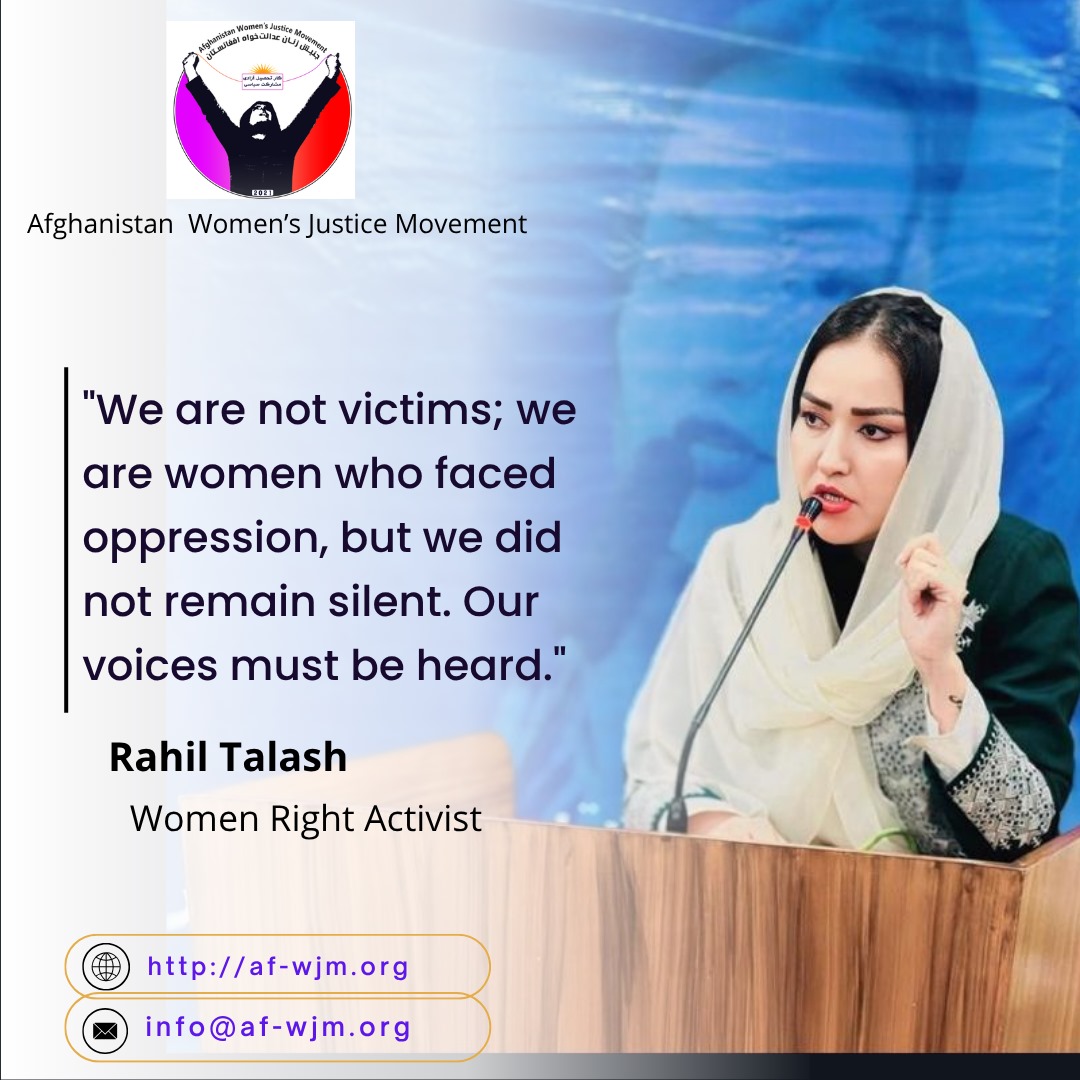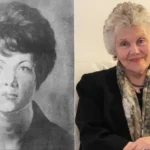
The Story of Rahil Talash’s Resistance — Women’s Rights Activist and Leadership Member of the Afghanistan Women’s Justice Movement
Introduction
Rahil Talash is one of those women who, with courage and a strong voice, stood up and spoke of the pain and cries of Afghan women during the darkest days of Afghanistan’s modern history. What she narrates is not merely her personal experience, but a reflection of the fate of thousands of women who endured oppression yet never bowed down. Her words are clear, direct, and full of hope for a better tomorrow. In this narrative, Rahil Talash recounts her days of struggle, threats, migration, and dreams for Afghanistan — another page from the book of women’s resistance amid darkness.
Methodology and Production Team
This interview was conducted in written form and online on June 6, 2025.
A questionnaire containing 15 standard questions from the “The Voice of a Woman Amid Darkness and Hope” program was prepared and sent to the interviewee.
The responses have been presented with complete fidelity to her words, without any alterations or content manipulation, exactly as given — to preserve the honesty, authenticity, legal, and historical value of the narrative.
From the full set of answers, only ten questions were selected and published in line with the editorial policy of the Afghanistan Women’s Justice Movement’s website.
Writer and Content Manager: Nasrin Faramarz — independent researcher, holder of a Master’s in Criminal Law and Criminology, and leadership member of the Afghanistan Women’s Justice Movement.
Senior Coordinator and Advisor: Huda Khamosh — writer and founder of the Afghanistan Women’s Justice Movement.
1. Please introduce yourself and tell us about your activities.
I am Rahil Talash, born in 1992. I completed my studies in Law and Political Science with a focus on International Relations. I have worked for nine years in civil, social, and cultural fields. Before the fall of the Republic, I collaborated with various institutions, including UN Habitat and the Ministry of Communications. I am now one of the leadership members of the Afghanistan Women’s Justice Movement.
2. Why did you decide to join women’s protests against the Taliban?
Because a system where women are deprived of their human rights is unacceptable to me. Like dozens of other women, I raised my voice on the streets of Kabul against the Taliban, said no to their oppressive regime, started working as a leadership member of the Afghanistan Women’s Justice Movement, and decided to be the voice of the women marginalized in Afghanistan by the Taliban.
3. What was your life like before the fall of the Republic?
I was the third daughter in my family and supported my six-member family. I would wake up every morning excited, first go to work, then to university, and return home. Like millions of other Afghan women, I had big dreams. My life had meaning — although there were challenges, I faced them with a smile and kept going because there was hope for positive change and progress.
4. When and how did you join the street and civil protests?
Although I had participated in street protests years before, after the fall and Taliban’s takeover (on August 15, 2021), seeing the videos of seven girls holding a silent protest in front of the Presidential Palace inspired me. I promised myself to stand beside the women of my homeland and fight. The first time I joined was at the protest held in front of the Ministry of Defense for equal citizenship rights, on September 4, 2021. I believe it was a wise decision, and I am proud of it.
5. Did you face any threats during your struggle?
Yes. During the protest on October 26, 2021, I was directly threatened with death by Taliban members. After that, I was repeatedly followed by them, had to change my place of residence, and eventually was forced to leave Afghanistan and seek refuge in Pakistan.
6. What was your migration journey like?
The word migration is never beautiful — leaving one’s homeland was the most bitter part of my life, forced upon me by the Taliban. Early in the morning on November 4, 2021 — a day I will never forget — I slipped out of the block, boarded a maroon-colored Saracha car, the driver was a young man, and I sat with my sister Khorshid. I rolled the window down and felt the Kabul air as though breathing it for the last time. I said goodbye to Kabul’s stones and woods, bid farewell to the nostalgic streets of Pul-e-Surkh. How could one leave all those sweet memories behind? It felt as if my city was upset with me, wanting to embrace me and say: Don’t leave, don’t abandon me. In the last moments, as the plane took off, I felt a piece of my heart ripped away and fell to the ground. I could not bear it anymore; I screamed and cried so loudly that I fainted. When I opened my eyes, everything had changed — I was now a homeless, helpless refugee. This pain, and those responsible for it, I will never forget.
7. How is your situation in the host country? Do you still continue your civil activities?
There are many challenges in Pakistan too — from residency status to economic and language barriers. Yet here as well, I never stayed silent, not even for a single day. In every condition, I tried to be the voice of Afghan women, especially when women were forced into silence in their homes. I tried to speak louder than ever in support of the women of my country, to advocate and expose injustices.
8. Have you faced challenges in life that made decision-making difficult?
When you are an Afghan girl, your very name is itself a challenge. But I never gave up and always challenged the challenges.
9. What is your dream for Afghanistan’s future?
I wish for a woman-led government in Afghanistan — a government where justice, equality, and humanity are the core principles, and where all ethnicities and genders enjoy equal rights and privileges.
10. What is your message to the international community?
My message to the international community is: fulfill your responsibility toward the people of Afghanistan sincerely. Do not play political games with the fate of millions of Afghans. Feel the pain of the Afghan people as if it were the pain and suffering of your own citizens.
Final Words
The voice of Afghan women, though entangled in violence and discrimination, cannot be silenced. Raheel Talash is one of the hundreds of women who rose with courage and stood firm — even in exile, she did not put down the burden of responsibility. She and women like her are not just heroes breaking the silence, but also builders of a hopeful future for the generations to come. The road may be difficult, but a road that leads to light and freedom is worth walking.




